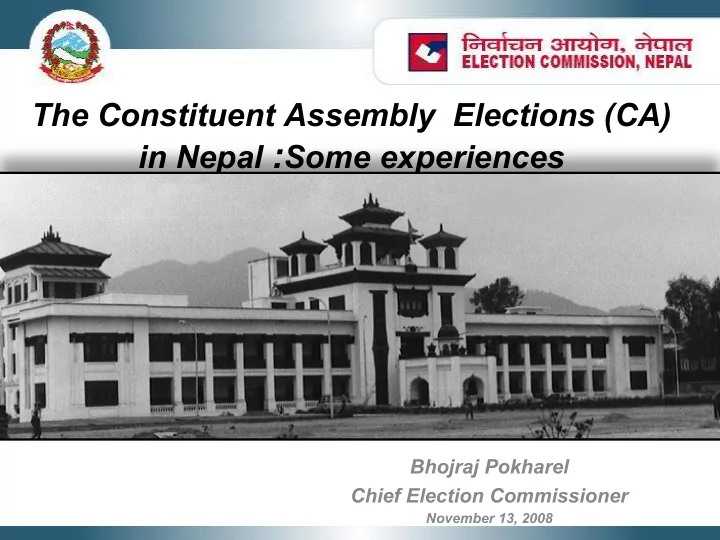

The Constituent Assembly Elections (CA) in Nepal : Some experiences Bhojraj Pokharel Chief Election Commissioner November 13, 2008
Outcome § Inclusive & Representative CA • 25 (9 +16) political parties • Proportional representation of various groups • 33% + women members § Results accepted § Republic institutionalized - Peaceful departure of the then King § Bullets to ballots (Rebels in power through the democratic process) 2
Context § Abnormal situation but expectation of a normal election: • - Poor security situation. • - National Army restricted within the barracks • - Electoral officials hesitant in accepting their election duties § Complexity of the post-conflict situation § Preparation for three elections but one result (June 2007, November 2007 and April 2008) § Gap between verbal commitment and actions of the leaders esp. in providing legal framework and other infrastructure for June election. 3
Context... § Blame Game between political stakeholders that contributed to uncertainty thereby crisis of confidence § Over ambitious timeline (Complications of peace process undermined) § Wrong assumptions (bullet culture and violent practices be changed just by signing the CPA) § Unequal players (to ensure fair play) § Credibility of the EC at zero level 4
Inherent Complexities § Post-conflict situation (in fact still in-conflict) § Difficult geographical terrain and diverse climatic condition (- 40 to +40 Celsius in a particular day in a distance of less than 250 miles) § Complex ethnic composition and over 100 languages § Low level of literacy § Elections culture with influence of money and muscles § Striking a delicate balance between the electoral standards and peace process ( Difficult choice- risk of breaking on rigidity or proceed with compromises) 5
Approach § Open & Transparent (Media was permanent invitee in all deliberations) § Broad Consultations ( involvement of stakeholders in all steps - increased the level of ownership of process - ultimately helped accept the election results) § At times EC acted beyond established standards and procedures (EC played a pro-active role as & when necessary. 3 time extension for nominations- beyond the general practices) 6
Features § Encouraging participation • 54 political parties participated out of 74 registered parties (10000 Signature verification for registration a complicated task) • Over 9000 candidates • Over 60 thousands national & 900 international observers, • 63 percent polling and encouraging participation of women. § Globally observed election - UN’s involvement in the field as well as monitoring through the EEMT § 2 $ cost per voter - one of the cheapest post-conflict elections . § Many unexpected deals/agreements between the major political actors throughout the election 7 process .
What made the election happen? § Electorate’s aspiration for peace - peace as dividend (People’s expectation that election will bring peace and stability in the country). § Perceived incentives for the key political parties (We will win the elections so let everything go normally). § Strong pressure from the civil society to create conducive environment § Powerful media (Media permanent invitees in all EC activities) § Large presence of national as well as international observers (they were requested to observe the elections understanding the political context of the country). 8
What made the election happen? § Strong commitment of the major leaders of the key political parties including the Prime Minister (I want to see the elections in my life time! My health is weak; let us not delay the process) § Good wishes and continuing support from the international community (Eg. President Carter) § Professionalism, confidence and commitment of the EC - enhanced credibility - everybody supportive to the Commission (A large group of allies always backing the EC) § The Common and ultimate goal - establishment of a republic 9
Challenges ahead! Nepal has entered into a new phase of transition but transformation to a sustainable peace and development is still a challenge § Drafting a new constitution within the limited time and its promulgation …… .. § Logical conclusion of peace process including management of the former combatants § Addressing expectations of the people 10
Focus of the EC To increase trust, confidence and credibility of the EC for free, fair and impartial election the EC will focus on § Institutional Strengthening § Professional Development § Voter Registry modernization for a reliable electoral roll and voter Identification § Reforms and integration of Electoral Legislations § Public Outreach and Voter Information/Education 11
Recommend
More recommend